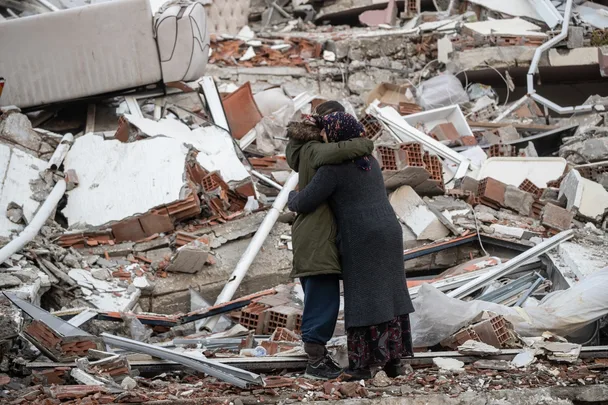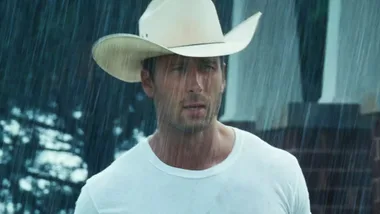On February 6, a catastrophic 7.8 magnitude earthquake struck Türkiye, destroying 11 provinces and killing more than 50,000 people. Here, three journalists—including the managing editor of marie claire Türkiye—share their harrowing experiences and hopes for the future.
Serli Gazer Boyaci, Managing Editor marie claire Türkiye

March issues of fashion magazines are considered sacred periods. The new-season trends and cultural approaches are meticulously selected by the editors and presented to readers in what is traditionally one of the most significant issues of the year from a fashion standpoint. This year was very different.
We were preparing for a day at work as news of the earthquake came through and, like many across Türkiye and the world, we couldn’t perceive the sheer magnitude of the event. As those first few hours passed, we began to understand the seriousness of the situation. The losses and wounded piled up and for the rest of us, mental collapse had begun. Those who had survived were in mourning, deep in sadness but also fuelled by anger. How can we continue our lives wracked with guilt that so many died but we survived?
All our emotions were intertwined and – as a team – the marie claire staff came together. Our traditional March fashion content was cast aside. Instead, we needed to talk about the horrifying events that had happened and, despite everything, focus on the glimmer of hope we now hold.
We want the world to know that to be Turkish means to be thick- skinned and to fight for ourselves. I learnt this at a young age. I grew up living through the disasters, scandals, suppressed voices and injustices that exist in our country. But with every event that occurs, we say “no more” and we live on.
Now, after the devastation of February 6, instead of saying, “no more” we now say “enough is enough”. I liken it to being hit in the face by a bucket of ice water.
We were woken up to the reality that we need to band together to ask the important questions we should’ve been asking long ago, to put aside our fear and give up our comfortable little worlds. We need to do away with complacency and demand answers. We have come to understand that it will make a difference if we demand a different future.
Something should have changed by now and as women in Türkiye we need to work together. This is what unites us. The destruction is what is left behind and will be a note in history but it will not be our future.
Özlem Gürses, Freelance journalist and television anchor
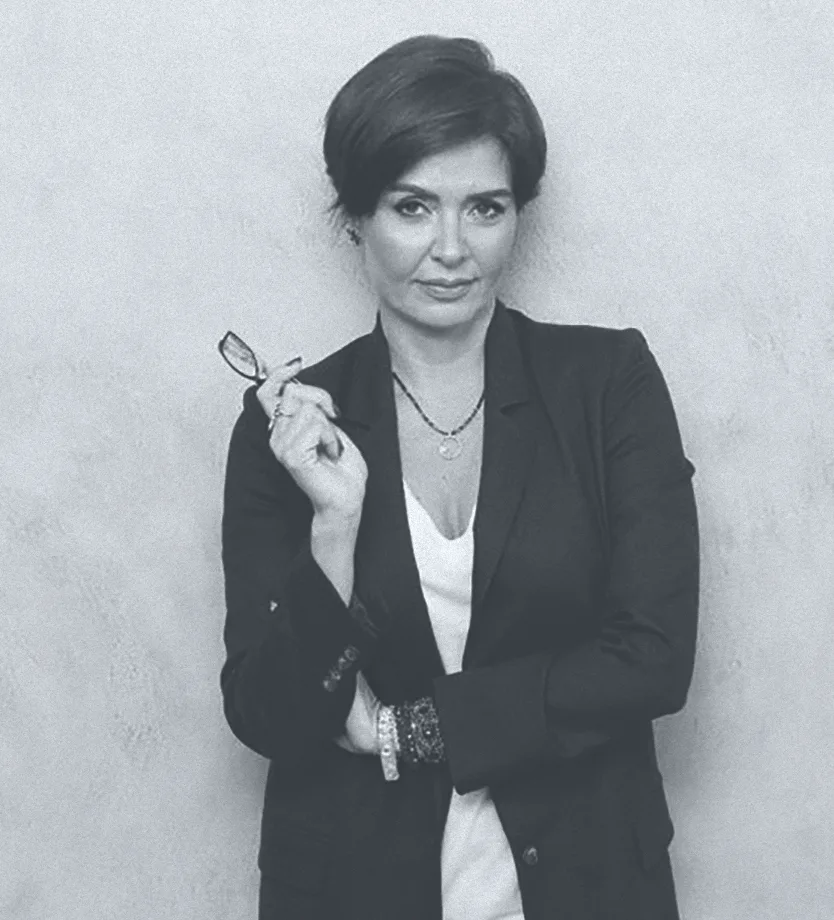
The night before the earthquake struck, I lay awake with crippling insomnia. Eventually, I took medication and drifted off to sleep. I had a real shock when I woke up in the morning to find out the country had just experienced what would turn out to be the biggest natural disaster of my lifetime.
As a journalist and storyteller I wanted to instantly jump in the car and go to the heart of the affected area, but the roads were destroyed and there was real chaos. Eventually after four days I found a route to get through, where I quickly learnt there was a gap between what was being told to us and the truth.
I headed to one of the worst- affected regions—the Hatay province in the south, which borders Syria. The roads were full of cars as people who had spent their entire lives in the area had packed up all their possessions and were trying to get out. The lines for fuel seemed endless. I saw the pain echoed across the faces of everyone. They all shared the same expression: empty nothingness.
The images of destruction and debris were unimaginable. Destroyed mosques, multi-storey apartment blocks that had folded in on themselves, tulle curtains hanging from intermingled floors, furniture that seemed to hang in the air. Piles of donated clothes and children’s toys were strewn over the streets – no organisation or coordination of volunteers existed in order to get these precious parcels to those most in need.
We then headed to Samandağ where people had been left to fend for themselves. My sadness multiplied. I came across a disabled person in a wheelchair who had survived the earthquake but he had nowhere to go. An old farmer with a disability had been pulled from the wreckage. His walker was shattered but he had survived. And the local people, whose houses and lives were mixed with dust, were sitting in plastic chairs looking out at the destroyed squares of concrete as though they were watching a movie.
I spoke to a woman who had been rescued. She was completely covered in a cloud of white dust, her hair was stiff with debris that looked like flour. She kept saying, “I want to wash my hair.” Nearby, there were a couple in the same cloud of debris “flour”, lying under a tree wrapped in blankets they had found.
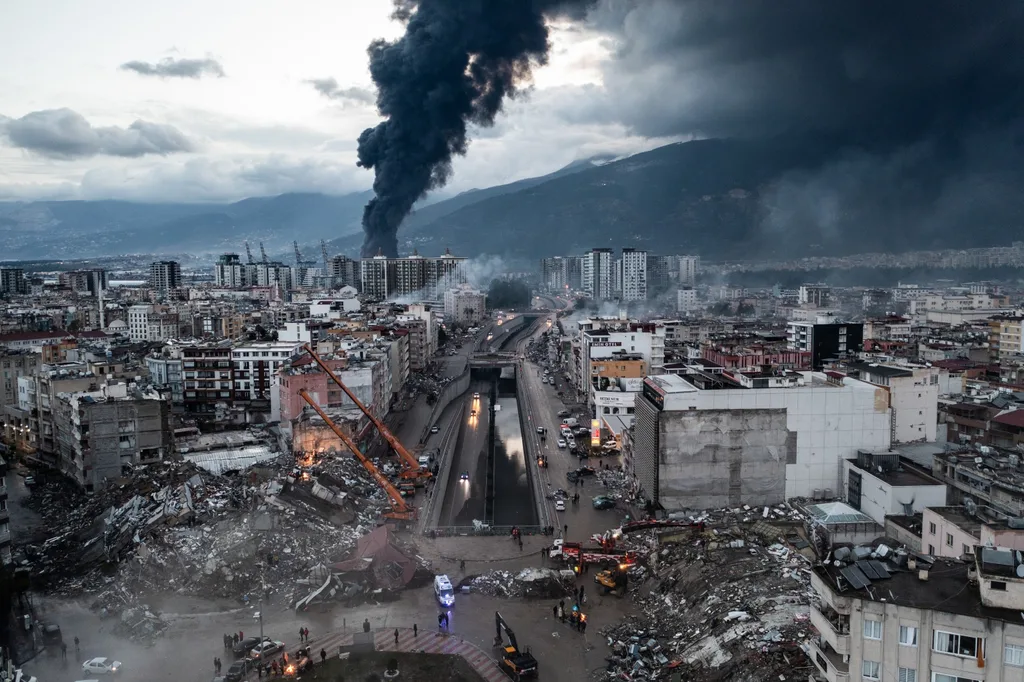
“We have a hygiene problem,” the woman told me. What she actually meant by “hygiene problem” was that she needed a pad, but she was too ashamed to say the words. Even when nose-to-nose with death, society has taught women to be embarrassed by their periods.
Children are gathered around us, some are playing while others are still with grief and shock. Some are with family, many are not. I don’t know what could be more painful than this.
I’ll never forget the haunting sight of a 10-year-old boy walking down a country road holding a toy rifle. “What’s the deal with this rifle?” I asked. “I need it to protect the neighbourhood,” he told me. I didn’t know what to say.
After Samandağ we went further inland, back through other neighbourhoods in Hatay. It was
like walking through the devastation of war. There was no such thing as streets anymore. Ruined houses were overlapping and intertwining. Who knows how many dead bodies were under the dishevelled piles of concrete? And there was a smell I knew from the 1999 earthquake…it was the smell of death. The surrounding towns were the same and everyone I spoke to brought feelings of deep pain, helplessness, loneliness, as well as anger.
National talk has now turned to construction. But we have been in this position before. In 1999 after the earthquake killed more than 17,000 people, authorities declared tougher building regulations would be introduced to reduce the impact of inevitable earthquakes. An “earthquake tax” was even implemented. Yet here we are again, 24 years later, and people are asking questions.
Turkey doesn’t need to be rebuilt with concrete, it needs to be rebuilt with science, merit and conscience. We can rebuild cities and we can persuade people to return. But we need to start first with nature and with the land itself. We need to reconcile. We have to fight to do it right.
There is no doubt that none of us are the same as before. Still, I choose to be hopeful, not angry because permanent change is only possible with hope. I hope we can all do it together.
Şelale Kadak, Freelance journalist and online producer
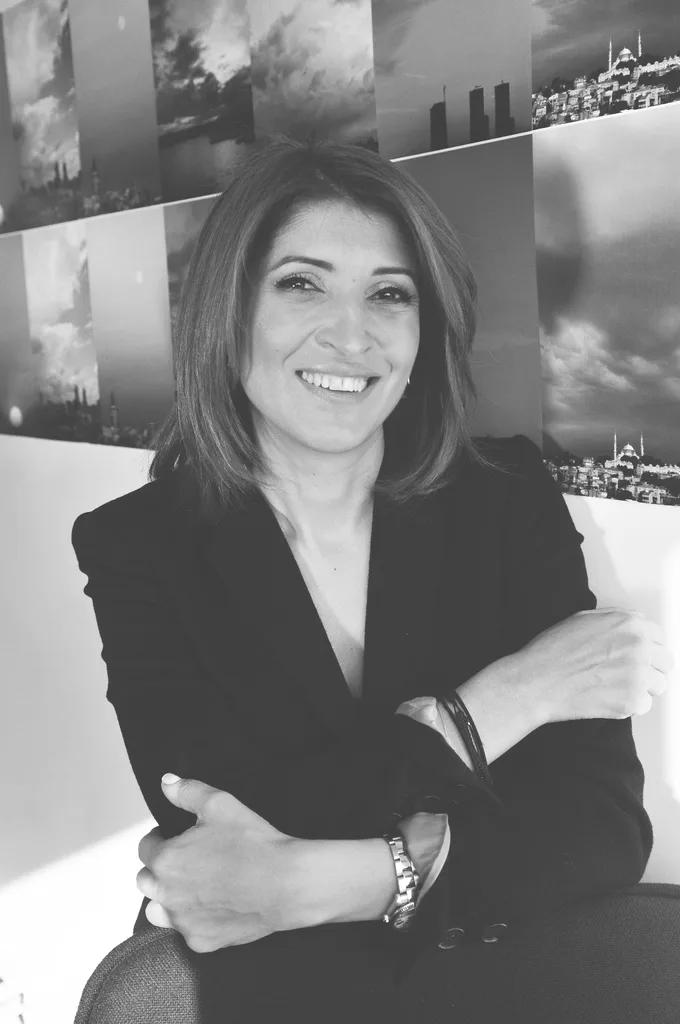
We have experienced a great disaster that shocked not only the people in the affected earthquake region, but this time all of Türkiye has been shaken. There is great pain and anger inside all of us. For even though earthquakes are inevitable, especially in Türkiye,
we might not have experienced this result of 50,000 deaths and hundreds of thousands of people homeless in a country that was prepared.
The city planning is completely in the control of the government, and we have every right to direct our anger towards them. We do not have to be resigned to this. At the time of writing, the government has not even apologised for their lack of preparation and delayed rescue response to the people of Türkiye.
Of course the sector in society who has been left most disadvantaged by the earthquake is women. The burden on women has grown exponentially. The housing crisis is the number one concern in the country, along with the education of children.
Before the earthquake, there were already tens of thousands of unhoused women living in tent and container cities. Life there was harder than you can imagine. With the earthquake destroying so many people’s homes, the homelessness will increase tenfold.
The government needs to shoulder the blame and admit the system is broken through all levels of government. It is their fault people are living in derelict and rotting buildings that have no chance of withstanding an earthquake.
While scientists in Eastern Türkiye have for years warned that a serious earthquake would cause such destruction, was any action taken? No. Were their warnings even taken seriously? No. After this, nothing can be the same as it was before. We will not forgive and we will not forget.
We must listen to the scientists and follow their instructions. Türkiye is one of the most beautiful countries in the world, brimming with a rich history and abundant culture. We, the people of Türkiye, have been through such a terrible ordeal and we don’t deserve it. This beautiful country needs to be made more liveable. We have no other choice.
This article originally appeared in the April issue of marie claire Australia.
